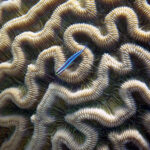
Class Anthozoa, Order Scleractinia, Family Mussidea, Genera Lobophyllia and Symphyllia Common names: open brain coral, lobed brain coral Natural origin: Indo-Pacific Sensitivity (Level 1 to 2): Sensitivity depends somewhat on species, but most are quite tolerant and forgiving when healthy and well fed. Feeding: These corals have strong prey capture ability. They typically have considerably… Read more »
